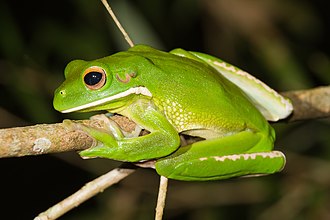White-lipped tree frog
(Redirected from White-lipped Tree Frog)
The white-lipped tree frog (Litoria infrafrenata) or the giant tree frog is a species of tree frogs. They are the largest tree frog in the world. They are native to Northern Queensland, New Guinea, the Bismarck Islands and the Admiralty Islands. They are related to the White's Tree Frog. The Giant Tree Frogs eats insects and other arthropods. They can live up to 10 years in the wild. In Australia, they can be kept as pets. Australians must have a license to have them.
| White-lipped tree frog | |
|---|---|

| |
| Conservation status | |
| Scientific classification | |
| Kingdom: | Animalia |
| Phylum: | Chordata |
| Class: | Amphibia |
| Order: | Anura |
| Family: | Pelodryadidae |
| Genus: | Nyctimystes |
| Species: | N. infrafrenatus
|
| Binomial name | |
| Nyctimystes infrafrenatus | |
| Synonyms | |
|
List
| |
- For another species called giant tree frog, see rusty tree frog or barking tree frog.
- For another species called white-lipped tree frog, see Ayarzaguena's tree frog.
- For another species called white-lipped tree frog, see Zhangixalus pachyproctus.
References
- ↑ Iskandar, D.; Mumpuni; Hero, J.; Retallick, R.; Richards, S. (2017). "Nyctimystes infrafrenatus". IUCN Red List of Threatened Species. IUCN. 2017: e.T41095A114114070. doi:10.2305/IUCN.UK.2017-1.RLTS.T41095A114114070.en. Database entry includes a range map and justification for why this species is of least concern.
- ↑ EOL.org
- ↑ Barker, J., Grigg, G. C., and Tyler, M. J. (1995). A Field Guide to Australian Frogs. Surrey Beatty and Sons, New South Wales.
- Iskandar et al. (2004). Litoria infrafrenata. 2006 IUCN Red List of Threatened Species. IUCN 2006. Retrieved on 11 May 2006. Database entry includes a range map and justification for why this species is of least concern
- Menzies, J.I. (1976). Handbook of Common New Guinea Frogs. Wau Ecology Institute.
- Cronin, L., (2001). Australian Reptiles and Amphibians, Envirobook, ISBN 0-85881-186-3
- Cogger, H.G. (2000). Reptiles and amphibians of Australia. Reed Books: Sydney.
Other websites
| Wikimedia Commons has media related to Lua error in Module:Commons_link at line 62: attempt to index field 'wikibase' (a nil value).. |
- Department of Environment and Resource Managmenent: White-lipped tree frog Archived 2011-09-12 at the Wayback Machine-Conservation status and audio of frog call
- Frog Australia Network Archived 2006-08-23 at the Wayback Machine-frog call available here.
- [1]
- Article Road: List of All Frog Breeds: Things You Can Do to Ensure Your Frog Has a Long, Happy and Healthy Life: White Lipped Tree Frog Archived 2012-07-27 at the Wayback Machine
- Department of Environment, Climate Change and Water, New South Wales: Amphibian Keeper's Licence: Species Lists Archived 2011-03-20 at the Wayback Machine
